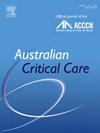机械通气肠内喂养患者早期与延迟使用的双交叉试验
IF 2.7
3区 医学
Q2 CRITICAL CARE MEDICINE
引用次数: 0
摘要
背景:肠内喂养、插管、有创机械通气重症监护病房(ICU)患者是否适宜使用尚存争议,且与腹泻有关。本研究的目的是评估方便给药的时间是否会影响这类患者腹泻及相关并发症的发生率和时间。方法对机械通气、肠内喂养的成人进行整群、双交叉、随机试验。我们比较了“延迟”通便使用(肠内喂养第6天开始)和“提前”通便使用(肠内喂养第1天开始)。主要结局是腹泻的发生。次要结局包括第一次排便时间、粪便管理装置插入率、肠梗阻率、ICU住院时间和死亡率。数据采用贝叶斯分析进行分析。结果纳入的177例患者中,延迟通气组42.4%、早期通气组44.9%出现腹泻(优势比:0.91[95%可信区间:0.52 ~ 1.61];获益概率:62.4%)。然而,延迟通便组患者出现腹泻的时间较晚。此外,延迟通便组6天后腹泻的发生率较低(21.2% vs. 44.9%;优势比:0.37[95%可信区间:0.20 ~ 0.68];获益概率:99.9%)。其他次要结局包括肠梗阻率、ICU住院时间和死亡率无显著差异。结论给药时机不影响腹泻的发生或其他以患者为中心的结局,但会延迟其发生。这些发现表明,延迟开药对腹泻的影响有限。本文章由计算机程序翻译,如有差异,请以英文原文为准。
A cluster double-crossover trial of early versus delayed aperient use in mechanically ventilated, enterally fed patients
Background
Aperient use in enterally fed, intubated, invasively mechanically ventilated intensive care unit (ICU) patients remains controversial and is associated with diarrhoea. The aim of this study was to assess whether the timing of aperient administration impacts the incidence and timing of diarrhoea and related complications in such patients.
Methods
We conducted a cluster, double-crossover, randomised trial in mechanically ventilated, enterally fed adults. We compared “delayed” aperient use (started on day 6 of enteral feeding) to “early” aperient use (started on day 1 of enteral feeding). The primary outcome was the occurrence of diarrhoea. Secondary outcomes included time until first defecation, rate of faecal management device insertion, rate of ileus, ICU length of stay, and mortality. Data were analysed using a Bayesian analysis.
Results
Of the 177 patients included, 42.4% in the delayed aperient group and 44.9% in early group developed diarrhoea (odds ratio: 0.91 [95% credible interval: 0.52 to 1.61]; probability of benefit: 62.4%). Diarrhoea, however, occurred later in patients in the delayed aperient group. Moreover, the occurrence of diarrhoea after day 6 was less in the delayed aperients group (21.2% vs. 44.9%; odds ratio: 0.37 [95% credible interval: 0.20 to 0.68]; probability of benefit: 99.9%). Other secondary outcomes including rate of ileus, ICU length of stay, and mortality did not show significant difference.
Conclusion
The timing of aperient administration did not impact the occurrence of diarrhoea or other patient-centred outcomes but delayed its onset. These findings suggest that delaying aperients has limited impact on diarrhoea.
求助全文
通过发布文献求助,成功后即可免费获取论文全文。
去求助
来源期刊

Australian Critical Care
NURSING-NURSING
CiteScore
4.90
自引率
9.10%
发文量
148
审稿时长
>12 weeks
期刊介绍:
Australian Critical Care is the official journal of the Australian College of Critical Care Nurses (ACCCN). It is a bi-monthly peer-reviewed journal, providing clinically relevant research, reviews and articles of interest to the critical care community. Australian Critical Care publishes peer-reviewed scholarly papers that report research findings, research-based reviews, discussion papers and commentaries which are of interest to an international readership of critical care practitioners, educators, administrators and researchers. Interprofessional articles are welcomed.
 求助内容:
求助内容: 应助结果提醒方式:
应助结果提醒方式:


